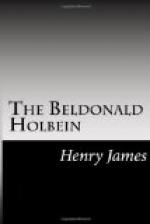My anecdote, however, would lose half the point it may have to show were I to omit all mention of the consummate turn her ladyship appeared gradually to have found herself able to give her deportment. She had made it impossible I should myself bring up our old, our original question, but there was real distinction in her manner of now accepting certain other possibilities. Let me do her that justice; her effort at magnanimity must have been immense. There couldn’t fail of course to be ways in which poor Mrs. Brash paid for it. How much she had to pay we were in fact soon enough to see; and it’s my intimate conviction that, as a climax, her life at last was the price. But while she lived at least—and it was with an intensity, for those wondrous weeks, of which she had never dreamed—Lady Beldonald herself faced the music. This is what I mean by the possibilities, by the sharp actualities indeed, that she accepted. She took our friend out, she showed her at home, never attempted to hide or to betray her, played her no trick whatever so long as the ordeal lasted. She drank deep, on her side too, of the cup—the cup that for her own lips could only be bitterness. There was, I think, scarce a special success of her companion’s at which she wasn’t personally present. Mrs. Munden’s theory of the silence in which all this would be muffled for them was none the less, and in abundance, confirmed by our observations. The whole thing was to be the death of one or the other of them, but they never spoke of it at tea. I remember even that Nina went so far as to say to me once, looking me full in the eyes, quite sublimely, “I’ve made out what you mean—she is a picture.” The beauty of this moreover was that, as I’m persuaded, she hadn’t really made it out at all—the words were the mere hypocrisy of her reflective endeavour for virtue. She couldn’t possibly have made it out; her friend was as much as ever “dreadfully plain” to her; she must have wondered to the last what on earth possessed us. Wouldn’t it in fact have been after all just this failure of vision, this supreme stupidity in short, that kept the catastrophe so long at bay? There was a certain sense of greatness for her in seeing so many of us so absurdly mistaken; and I recall that on various occasions, and in particular when she uttered the words just quoted, this high serenity, as a sign of the relief of her soreness, if not of the effort of her conscience, did something quite visible to my eyes, and also quite unprecedented, for the beauty of her face. She got a real lift from it—such a momentary discernible sublimity that I recollect coming out on the spot with a queer crude amused “Do you know I believe I could paint you now?”




